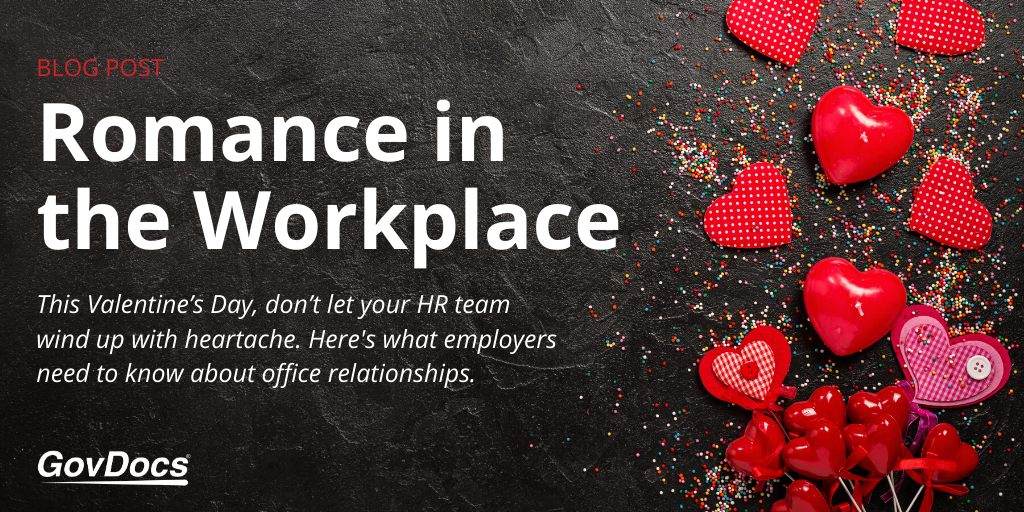EMPLOYMENT LAW NEWS
Romance in the Workplace: What Employers Need to Know
By Kris Janisch
Published Feb. 14, 2020

Relationships between employees often cause problems for businesses. And in the #MeToo Era, employers should be especially cautious.
It’s Valentine’s Day. Love is in the air. Is romance also in the air at your workplace?
Office relationships may seem cute, especially on this most romantic of holidays. But when Cupid’s arrow strikes, it can leave your HR team with heartbreak.
Relationships between employees often cause problems for businesses: favoritism, harassment lawsuits, conflicts of interest, gossip, toxic work environments… things can get ugly in a hurry when a relationship turns sour.
Plus, office romance can land a company in the headlines for inappropriate relationships. And in the #MeToo Era, employers should be especially cautious.
Meanwhile, a Society for Human Resource Management survey released ahead of Valentine’s Day found one-third are or have been romantically involved with a colleague, up from 27 percent pre-pandemic.
Workplace Romance
A 2018 survey of more than 650 professionals across a wide range of industries found that 52 percent have engaged in some form of romance with a coworker, from a “random hookup” to a long-term relationship.
 While there are no laws regulating workplace relationships, prudent companies should establish official policies to help sidestep potential issues.
While there are no laws regulating workplace relationships, prudent companies should establish official policies to help sidestep potential issues.
Legal hassles can arise from coworkers being romantically involved, especially when it comes to supervisor-subordinate relationships. Of course, even if a company has a no-dating policy in place, that doesn’t mean employees will adhere to it.
Effects of Workplace Relationships
There tends to be a ripple effect when it comes to workplace relationships.
Gossip leads to lost productivity. Employees wonder whether opportunities are linked to romantic involvement. Confidential information gets shared when it otherwise wouldn’t. Jilted lovers turn into sniping adversaries.
The real fear, however, is a sexual harassment or discrimination lawsuit. When people break up, hard feelings can become accusations of coercion, inappropriate speech or behavior, or other forms of harassment. Justified or not, these allegations must be dealt with by employers, who are legally bound to take reasonable steps to prevent harassment in the workplace.
Policies for Workplace Romance
While not a panacea for problems that stem from workplace romance, creating a clear policy regarding consensual relationships is the first step every employer should take.
Establish clear definitions and outline consequences in the employee handbook. If employees do disclose a relationship, having them review company policies regarding sexual harassment is a good practice, as well.
No-dating
Some companies choose to impose a complete ban on dating among employees.
As stated above, however, this can prove difficult to enforce and could give rise to privacy issues. Additionally, it can be challenging to establish whether employees are dating or merely friends outside of work.
Managers and Subordinates
When it comes to romance in the workplace, the biggest issues are often related to a manager dating a subordinate. One common measure a company can take with its dating policy is to disallow such relationships.
Employers could require them to disclose the relationship and/or move one of the individuals to a different role. Forcing someone to change jobs can be tricky, however, because it could open the door to lawsuits. Regardless, documenting the process openly is generally a good idea.
Love Contracts
Should employees come to HR to divulge a relationship, businesses can opt to have them enter into so-called “love contract.”
This document generally requires those involved to acknowledge the relationship will not interfere with work and affirms the relationship is consensual. It may also outline appropriate workplace behavior such as not engaging in favoritism or bringing lovey-dovey talk into the office.
Typically, the contract also includes information about sexual harassment policies and asks the parties to not bring legal action against the company if the relationship ends.
Conclusion
Workplace romance doesn’t have to end in heartache. A 2017 CareerBuilder survey found that 30 percent of office relationships have ended with marriage. Aww.
Still, they can be fraught with challenges for employers. Instead of roses or chocolate this Feb. 14, take a pass at how your company wants to approach romance in the workplace.
Happy Valentine’s Day!
New name. Same great content. To better reflect the nature of the GovDocs blog, and the company’s mission, we have updated the name. Welcome to Employment Law News!
This Employment Law News Blog is intended for market awareness only, it is not to be used for legal advice or counsel.
Keep Informed
with GovDocs Employment Law News
What is GovDocs?
GovDocs, Inc., is a leading provider of employment law management solutions for large, multilocation employers in the U.S. and Canada. With the GovDocs cloud-based platform, our clients easily manage labor law posting programs and minimum wage rates down to the individual location and across the enterprise. All GovDocs’ products are powered by continuous research and innovation to help clients be compliant. The company is headquartered in St. Paul, Minn.
Have fewer than 30 locations?
The GovDocs Poster Store simplifies posting compliance for employers with less than 30 locations across all industries, offering a variety of posting products to meet your labor law compliance needs.


